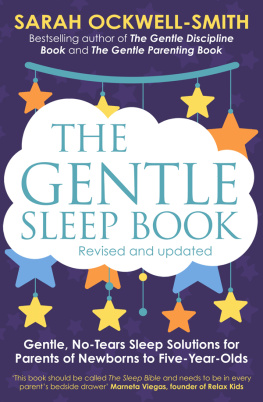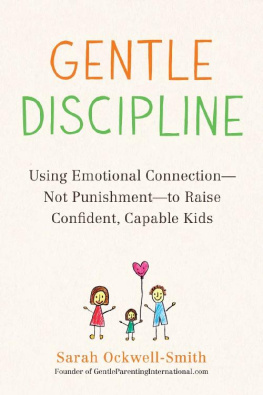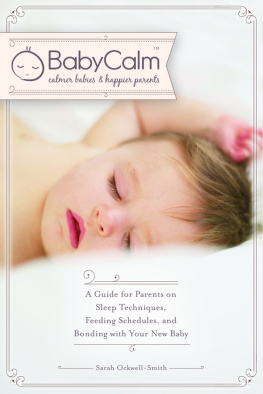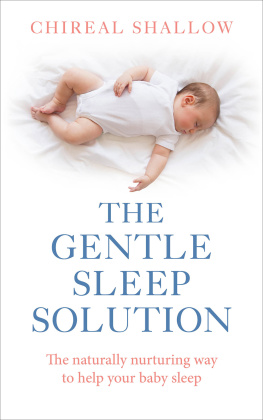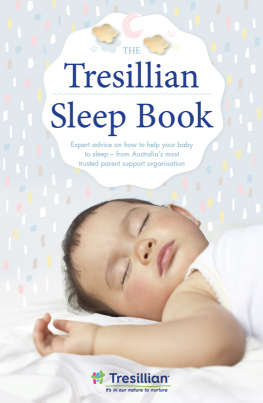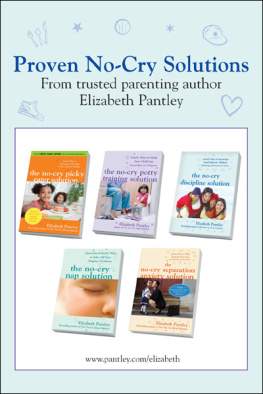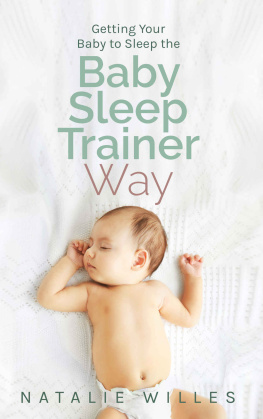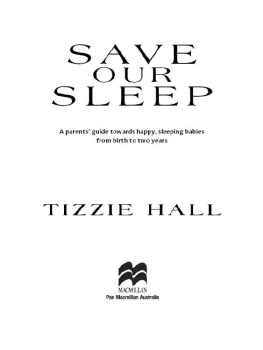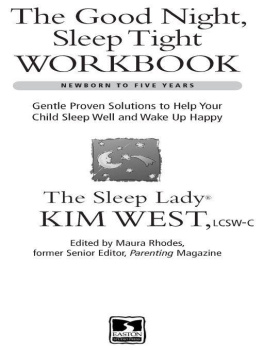Praise for The Gentle Sleep Book
Sleep is so crucial to our wellbeing, and so precious when our children are young. This is why it has become such a contentious issue among parenting writers and experts. In The Gentle Sleep Book, Sarah Ockwell-Smith starts by looking at scientific, cultural and historical perspectives and so allows us to put sleep in context. Her central message is that children dont have sleep problems, we as a society have created expectations and demands of parenting that are not in harmony with a childs biological or psychological needs and then struggle when children dont sleep as we need them to.
I like the perspective Sarah takes, the position of trying to make parents feel informed and supported rather than criticised. Sleep is not a battle, its a balance and in this reassuring book Sarah helps parents find that balance. Often Sarahs advice is not to fight your childs sleep pattern but to try to find help for yourself so that you are better able to cope. This, I think, is a wonderful gentle message that would benefit many aspects of family life.
Saffia Farr, Editor, JUNO magazine
This book is a wonderful blend of science and wisdom. Using the latest scientific research as a foundation, Sarah teaches families how to use a responsive and nurturing hand to guide babies and toddlers into age-appropriate sleep. It will help parents develop realistic expectations about the course of their infants sleep development, giving them reassurance and the confidence to use the specific strategies provided in a way that it is just right for their child.
Sara Pearce RN CNM IBCLC, CEO, Director of Education, Amma Parenting Center
This book should be called The Sleep Bible and needs to be in every parents bedside drawer. As always, Sarah Ockwell-Smith has written a book that is easy to read and jam-packed with refreshing new ideas to help little ones relax and sleep, and to help parents reduce their dark circles and eye bags!
Marneta Viegas, founder of Relax Kids classes, books and CDs to help children relax, manage anxiety and stress, and sleep

For my children; my greatest teachers.
PIATKUS
First published in Great Britain in 2015 by Piatkus
This revised and updated edition published in 2020 by Piatkus
Copyright Sarah Ockwell-Smith 2020
The moral right of the author has been asserted.
All rights reserved.
No part of this publication may be reproduced, stored in a retrieval system, or transmitted in any form or by any means, without the prior permission in writing of the publisher, nor be otherwise circulated in any form of binding or cover other than that in which it is published and without a similar condition including this condition being imposed on the subsequent purchaser.
A CIP catalogue record for this book is available from the British Library.
ISBN 978-0-349-40521-6
Piatkus
An imprint of
Little, Brown Book Group
Carmelite House
50 Victoria Embankment
London EC4Y 0DZ
An Hachette UK Company
www.hachette.co.uk
www.littlebrown.co.uk
About the author
Sarah Ockwell-Smith is a mother of four. She has a BSc in Psychology and worked for several years in pharmaceutical research and development. Following the birth of her first child, Sarah retrained as an antenatal teacher, and birth and postnatal doula. She has also undertaken training in infant massage, hypnotherapy and psychotherapy.
Sarah has worked with thousands of parents, helping them to settle into life as a new family and to cope with the challenges of raising their children from birth to school age and beyond, with a special focus on child sleep. She blogs at www.sarahockwell-smith.com and frequently writes for international news sources, including the HuffPost. Sarah regularly appears on national radio and television and is considered an expert in gentle parenting methods.
Contents
Chapter 1
Understanding normal sleep physiology
Chapter 2
Sleep throughout history and the impact of modern life
Chapter 3
Sleep around the world and how other parents cope
Chapter 4
The effect of diet on sleep
Chapter 5
The problems with modern sleep-training techniques
Chapter 6
BEDTIME: practical sleep tips
Chapter 7
Sleep from birth to three months
Chapter 8
Sleep at age three to six months
Chapter 9
Sleep at age six to twelve months
Chapter 10
Sleep at age one to two years
Chapter 11
Sleep at age two to three years
Chapter 12
Sleep at age three to five years
Chapter 13
All about naps
Chapter 14
Coping with sleep deprivation and exhaustion as a parent
Chapter 15
Summary and sleep action plan
A big thank-you to my agent Eve, at Eve White Literary Agency, for her help and direction; and to Zoe and Jillian at Piatkus, for continually making sense of what I am trying to say.
As ever, I am indebted to my family; to my husband and my children for their patience and pride in my work. I couldnt do it without you.
Lastly, thank you to you, the reader, for choosing to read my book over the myriad of other baby and child sleep books on the market. What an honour that is. I hope you enjoy The Gentle Sleep Book and that it helps you to get a little more sleep, and reassures you that you really are doing a great job as a parent!
H ow is your baby sleeping? It is the question all new parents face from family and strangers alike, and if the answer is anything less than Its wonderful! Shes sleeping 12 hours a night, parents are treated to countless suggestions as to how they can improve the situation.
We are a society obsessed with sleep. The amount your child sleeps is the yardstick by which other parents judge not only your parenting skills but also your childs development. In the eyes of many, failing to sleep well within the appropriate time frame will ensure your child faces a bleak future from which he will never recover and it will all be your fault. Or so they say.
In my own work, sleep issues make up approximately 90 per cent of the concerns or questions parents have. Even parents who admit that their sleep situation works well for them can reach the point where they start to wonder if they are doing something wrong because their child isnt sleeping like they are supposed to. In fact, the vast majority of questions about sleep focus on behaviours that the parents worry is bad or will lead their child down the dreaded path towards never sleeping well. For me, as someone who is trying to help these families, what is perhaps most frustrating is that, from a biological point of view, their childs behaviour is entirely normal.
Yes, normal. We may not realise it, but so much of what we have been led to believe is bad or will damage our childs chances of sleeping such as nursing to sleep, co-sleeping, or not having a set schedule for sleep are not new inventions. Historically, children, particularly babies, did not have regimented sleep. They slept when they were tired, were often nursed to sleep, and slept close to their mother (facilitating breastfeeding at night and during the day). They learned to sleep as adults did, which, contrary to what todays ideals dictate, was not throughout the night. As Sarah points out in the chapter on the history of sleep, adults sleeping through the night is a relatively new development that was partly brought about by the demands of the industrial revolution. It begs the question: are our expectations of childrens sleep based more on cultural norms than their natural sleep patterns?

